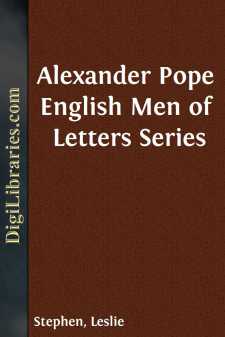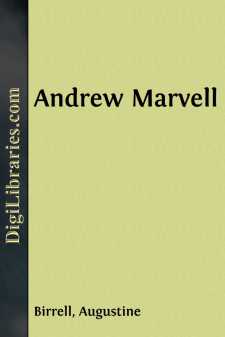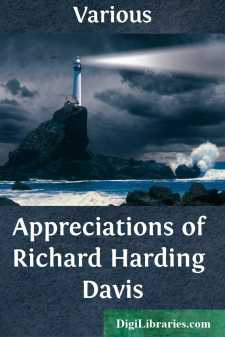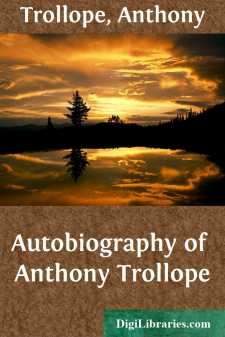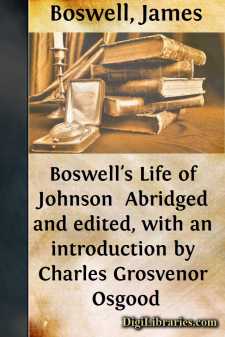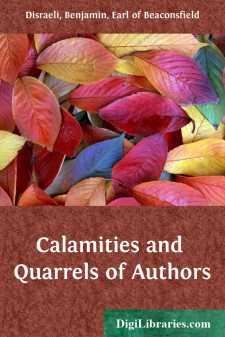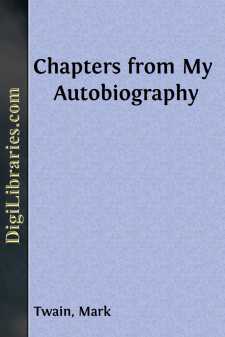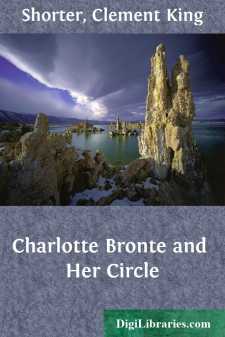Biography & Autobiography
- Adventurers & Explorers 15
- Artists, Architects, Photographers 16
- Business 2
- Composers & Musicians 14
- Criminals & Outlaws 5
- Cultural Heritage 1
- Editors, Journalists, Publishers 6
- Educators 1
- Entertainment & Performing Arts 3
- General 73
- Health, Exercise & Fitness 1
- Historians 3
- Historical 83
- Law Enforcement 1
- Lawyers & Judges 3
- Literary
- Medical 7
- Military 48
- Naturalists, Gardeners, Environmentalists 8
- Personal Memoirs & Diaries 227
- Philosophers 3
- Political 9
- Presidents & Heads of State 38
- Religious 39
- Rich & Famous 27
- Scientists 13
- Women 31
Literary Books
Sort by:
by:
Leslie Stephen
PREFATORY NOTE. The life and writings of Pope have been discussed in a literature more voluminous than that which exists in the case of almost any other English man of letters. No biographer, however, has produced a definitive or exhaustive work. It seems therefore desirable to indicate the main authorities upon which such a biographer would have to rely, and which have been consulted for the purpose...
more...
CHAPTER I EARLY DAYS AT SCHOOL AND COLLEGE The name of Andrew Marvell ever sounds sweet, and always has, to use words of Charles Lamb’s, a fine relish to the ear. As the author of poetry of exquisite quality, where for the last time may be heard the priceless note of the Elizabethan lyricist, whilst at the same moment utterance is being given to thoughts and feelings which reach far forward to...
more...
by:
Stapleton Martin
ANNA SEWARD Anna Seward, a daughter of the Rev. Thomas Seward, destined to become, by universal assent, the first poetess of her day in England, was born 12th December, 1747. Her mother was Elizabeth, one of the three daughters of the Rev. John Hunter (who was in 1704 appointed Head Master of Lichfield Grammar School), by his first wife, Miss Norton, a daughter of Edward Norton, of Warwick, and...
more...
by:
Various
He was almost too good to be true. In addition, the gods loved him, and so he had to die young. Some people think that a man of fifty-two is middle-aged. But if R. H. D. had lived to be a hundred, he would never have grown old. It is not generally known that the name of his other brother was Peter Pan. Within the year we have played at pirates together, at the taking of sperm whales; and we have...
more...
by:
Anthony Trollope
PREFACE It may be well that I should put a short preface to this book. In the summer of 1878 my father told me that he had written a memoir of his own life. He did not speak about it at length, but said that he had written me a letter, not to be opened until after his death, containing instructions for publication. This letter was dated 30th April, 1876. I will give here as much of it as concerns the...
more...
by:
James Boswell
INTRODUCTION Phillips Brooks once told the boys at Exeter that in reading biography three men meet one another in close intimacy—the subject of the biography, the author, and the reader. Of the three the most interesting is, of course, the man about whom the book is written. The most privileged is the reader, who is thus allowed to live familiarly with an eminent man. Least regarded of the three is...
more...
The Calamities of Authors have often excited the attention of the lovers of literature; and, from the revival of letters to this day, this class of the community, the most ingenious and the most enlightened, have, in all the nations of Europe, been the most honoured, and the least remunerated. Pierius Valerianus, an attendant in the literary court of Leo X., who twice refused a bishopric that he might...
more...
by:
Mark Twain
INTRODUCTION. I intend that this autobiography shall become a model for all future autobiographies when it is published, after my death, and I also intend that it shall be read and admired a good many centuries because of its form and method—a form and method whereby the past and the present are constantly brought face to face, resulting in contrasts which newly fire up the interest all along, like...
more...
PRELIMINARY: MRS. GASKELL In the whole of English biographical literature there is no book that can compare in widespread interest with the Life of Charlotte Brontë by Mrs. Gaskell. It has held a position of singular popularity for forty years; and while biography after biography has come and gone, it still commands a place side by side with Boswell’s Johnson and Lockhart’s Scott. As far as...
more...
CHAPTER 1. CHAUCER'S TIMES. The biography of Geoffrey Chaucer is no longer a mixture of unsifted facts, and of more or less hazardous conjectures. Many and wide as are the gaps in our knowledge concerning the course of his outer life, and doubtful as many important passages of it remain—in vexatious contrast with the certainty of other relatively insignificant data—we have at least become...
more...


